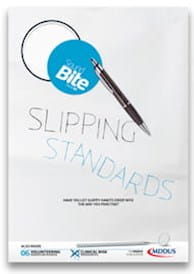ALISON is two months into her dental vocational training. one night, she is driving home from work and takes an alternative route to avoid roadworks. She momentarily takes her eyes off the road to check her rear view mirror just as the road turns sharply to the left. Her car drifts over the centre line, clipping an oncoming vehicle.
No one is hurt in the accident but Alison is later convicted under Section 3 (careless driving) of the Road Traffic Act. She is issued with a fine and her licence is endorsed. A few months later she is shocked to receive a letter from the General Dental Council. Her conviction has been reported by the police and she has now been contacted to provide her “observations” on the incident to a GDC investigating committee. Failure to do so could result in suspension from the dental register.
Where does Alison stand regarding legal advice in this case? For any dentist who finds themselves in such a scenario, it depends entirely on whether or not you have appropriate indemnity cover. If you have failed to arrange such cover then the cost of appointing legal representation for a possible appearance at a GDC fitness to practise hearing could run into thousands of pounds and be a very stressful experience.
Fortunately for Alison she was a member of MDDUS at the time of the car crash and she was able to access support and advice to guide her safely through the GDC procedures.
This scenario is based on a real case at MDDUS and demonstrates why membership of a dental defence organisation (DDO) should not be considered as an optional extra for dental trainees.
MDDUS is an independent ‘mutual’ DDO. General dental practitioners pay an annual subscription fee and in return receive access to appropriate legal representation and indemnity for damages and costs arising from judicial decisions or out-of-court settlements in clinical negligence cases. In addition MDDUS provides GDP members access to appropriate legal representation and support in GDC proceedings and in other professional matters. Hospital dentists employed by the NHS will be covered by Crown indemnity for clinical negligence but not for legal support in GDC matters, and for this reason many also belong to a DDO. All MDDUS dental members also enjoy access to a 24/7 telephone advisory service staffed by qualified dentists with expertise in dento-legal matters.
Most dental students will join at least one DDO or sometimes more if only just for the freebies handed out. But some may let that membership lapse once they graduate, perhaps in a bid to save money or maybe just through inaction. This is a serious error.
Those working in general dental practice are required by the GDC to have appropriate indemnity/insurance so that patients can claim any compensation they may be entitled to. The GDC recently issued an advice notice to patients urging them to check their dentist/dental care professional is properly insured or indemnified for the treatment they are carrying out. The regulator also advised patients how to make a complaint and to contact the GDC “if you think the dental professional treating you is a risk to other patients.”
MDDUS advises dentists to ensure they are fully compliant so they can meet their patients’ expectations and needs, as well as looking after themselves.
Under new government plans, the need for appropriate indemnity/insurance is expected to soon become a statutory requirement, meaning all healthcare professionals will be legally obliged to have the cover as a condition of their registration.
Failure to arrange appropriate indemnity cover could have serious consequences. A dentist from Glasgow hit the headlines in June when he was struck off by the GDC for operating without indemnity/insurance for almost 20 years. He argued that he had made his own arrangements to cover anything going wrong and that any claims would have limited value because of the field of dentistry in which he practised.
This was rejected by the GDC who said in their judgment: “Unexpected and severe complications can arise during the most basic of treatments which could have a great impact and involve unpredictable consequences. You were no different from any other general dental practice in terms of that risk and it is of great concern to this committee that you did not recognise this.” The dentist was banned from practising for at least five years.
So ensure you are fully protected today – and if in any doubt call the MDDUS membership line on 0845 270 2038.
Joanne Curran is associate editor of SoundBite
This page was correct at the time of publication. Any guidance is intended as general guidance for members only. If you are a member and need specific advice relating to your own circumstances, please contact one of our advisers.
Read more from this issue of Insight Primary

Save this article
Save this article to a list of favourite articles which members can access in their account.
Save to library